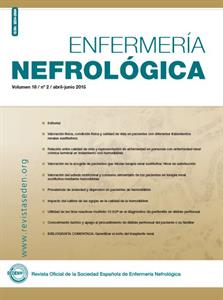Contenido del artículo principal
Resumen
Introducción: La hemodiálisis produce alteración de las actividades diarias de las personas con enfermedad renal crónica terminal que deterioran significativamente su calidad de vida. La forma en que estas personas representan su enfermedad influye en el control de la patología y en la calidad de vida.
Objetivo: evaluar la asociación entre representación de enfermedad y percepción de calidad de vida en personas con enfermedad renal crónica terminal en hemodiálisis.
Metodología: estudio correlacional predictivo, de corte transversal realizado en 100 personas con enfermedad renal crónica en hemodiálisis. Se utilizaron como instrumentos el IPQ-R (representación de enfermedad) y el KDQOL-SF (medición de la calidad de vida). Se aplicaron estadísticos descriptivos, analíticos y análisis de sendero. Resultados: se observó una puntuación más alta en la percepción de calidad de vida específica v/s genérica. En la representación de enfermedad se observa que aquellos que perciben menos signos y síntomas presentan menos consecuencias (r =0.317; p= 0.001), asimismo, quienes identifican menos consecuencias presentan menos síntomas psicológicos (r =0.496; p= 0.000) y mayor comprensión de la enfermedad (r =-0.428; p= 0.000). En la relación entre calidad de vida y representación de enfermedad se encontró una correlación inversa entre la percepción de signos y síntomas (identidad) y la percepción de calidad de vida general (r =-.403; p= 0.000) y específica (r =-.380; p= 0.000).
Discusión: es importante considerar la percepción del usuario en la evaluación de la calidad de vida y la representación de enfermedad, para favorecer su empoderamiento respecto de su enfermedad.
Objetivo: evaluar la asociación entre representación de enfermedad y percepción de calidad de vida en personas con enfermedad renal crónica terminal en hemodiálisis.
Metodología: estudio correlacional predictivo, de corte transversal realizado en 100 personas con enfermedad renal crónica en hemodiálisis. Se utilizaron como instrumentos el IPQ-R (representación de enfermedad) y el KDQOL-SF (medición de la calidad de vida). Se aplicaron estadísticos descriptivos, analíticos y análisis de sendero. Resultados: se observó una puntuación más alta en la percepción de calidad de vida específica v/s genérica. En la representación de enfermedad se observa que aquellos que perciben menos signos y síntomas presentan menos consecuencias (r =0.317; p= 0.001), asimismo, quienes identifican menos consecuencias presentan menos síntomas psicológicos (r =0.496; p= 0.000) y mayor comprensión de la enfermedad (r =-0.428; p= 0.000). En la relación entre calidad de vida y representación de enfermedad se encontró una correlación inversa entre la percepción de signos y síntomas (identidad) y la percepción de calidad de vida general (r =-.403; p= 0.000) y específica (r =-.380; p= 0.000).
Discusión: es importante considerar la percepción del usuario en la evaluación de la calidad de vida y la representación de enfermedad, para favorecer su empoderamiento respecto de su enfermedad.
Palabras clave
representación de enfermedad; calidad de vida; enfermedad renal crónica terminal; hemodiálisis.
Detalles del artículo
Licencia
Aviso de derechos de autor/a
© Los autores ceden de forma no exclusiva los derechos de explotación de los trabajos publicados y consiente en que su uso y distribución se realice con la Licencia Creative Commons Atribución - No comercial 4.0 Internacional (CC BY-NC 4.0). Puede consultar desde aquí la versión informativa y el texto legal de la licencia. Esta circunstancia ha de hacerse constar expresamente de esta forma cuando sea necesario.
Cómo citar
1.
Pérez Acuña C, Riquelme Hernández G, Scharager Goldenberg J, Armijo Rodríguez I. Relación entre calidad de vida y representación de enfermedad en personas con enfermedad renal crónica terminal en tratamiento con hemodiálisis. Enferm Nefrol [Internet]. 2015 [consultado 19 Dic 2025];18(2):[aprox. 8 p.]. Disponible en: https://www.enfermerianefrologica.com/revista/article/view/3988




